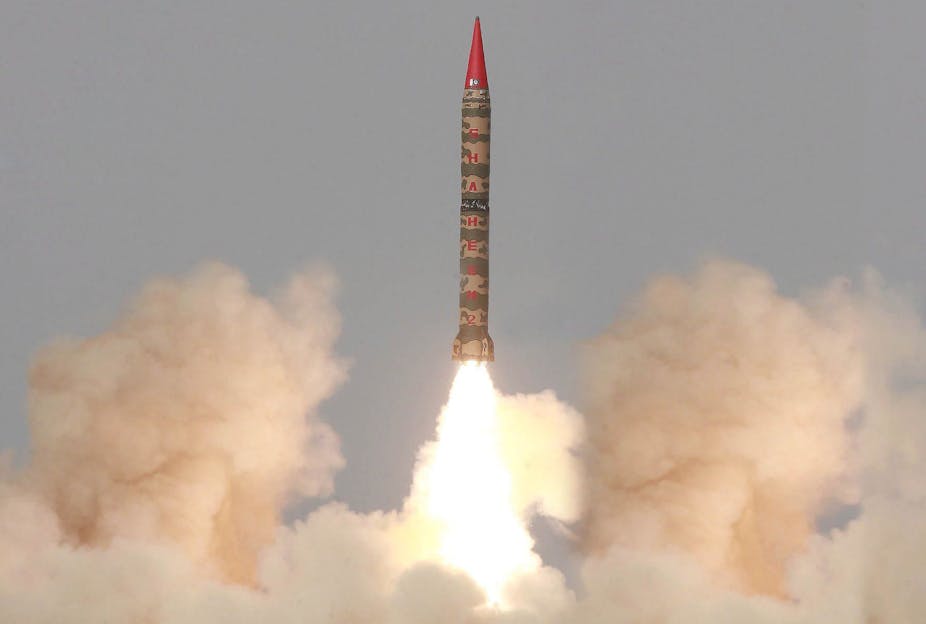Predictably, Pakistan is seeking equal treatment with India on uranium sales from Australia.
Pakistan’s High Commissioner to Australia Abdul Malik Abdullah has argued that if Australia changes its policy on supplying uranium to India then it should supply Pakistan as well. “All we would like to have is an equitable and non-discriminatory decision” from Australia, he said.
The High Commissioner’s position is entirely understandable. For decades Pakistan has sought to assert parity with India in the international arena. But it is becoming increasingly difficult to get others to accept that there is a necessary linkage between the two nations created from the partition of British India in 1947.
As India’s economy has grown at increasingly impressive rates over the past decade, Pakistan’s has faltered and languished. When strategic analysts peer into the likely shape of Asia in the next two decades, their focus is on China as a “rising power” and on India. Pakistan, despite its huge army and nuclear and ballistic missile capabilities, won’t have the population size and economic resources to be in the same league.
Nowhere is the “breaking of parity” going to be more evident that in the supply of uranium. Australia’s policy of not supplying uranium to countries that have not signed the Nuclear Non-Proliferation Treaty (NPT) is intended to bolster the international effort to contain the spread of nuclear weapons (as Edmond Roy points out). Signatories to the NPT pledge “never to acquire nuclear weapons”.

India has consistently refused to sign the NPT on the grounds of principle, namely that the treaty creates a privileged club of legitimate nuclear weapons powers: those countries – the United States, Britain, France, Russia and China – that tested a device before 1957, and a rump of others who will never acquire them.
India has never dissented from the NPT, per se, just its discriminatory clauses. It has also been a consistent critic of the failures of those in the nuclear club to seriously engage in nuclear disarmament, another key aspect of the treaty. Pakistan also refused to sign the NPT.
In 1974, four years after the NPT came into force, India tested what it euphemistically called a “nuclear device” — not to be confused with a “weapon”, of course. In, 1998 both India and Pakistan tested fission and fusion weapons. There was no question about what was exploded that time. It was a disastrous moment from the point of view of containing the spread of nuclear weapons.
But it does raise the very awkward question of what the relevance of the NPT is for such countries that have acquired nuclear weapons. Can they, for instance, sign up retrospectively and be included in the nuclear weapons club? In effect, that is the purpose of US-India Civil Nuclear Cooperation agreement, announced in 2005. India has indicated which of its reactors are for civilian use and which for military purposes and has agreed to accept international inspection and regulation of the former. Much the same terms as apply to NPT signatories.
This is a decidedly messy way of dealing with the unalterable facts on the ground in South Asia. What makes it acceptable, in my view, is that India appears to have an impeccable record on non-proliferation.
There is no evidence I am aware of where Indian nuclear technology has been sold or given to another country. The control of India’s nuclear weapons is very clearly under civilian control.
The same cannot be said for Pakistan. The activities of the AQ Khan network in selling equipment and technology to other states show Pakistan to have been an active proliferator (as Adrian Levy and Catherine Scott-Clark point out in their book, Deception: Pakistan, the United States and the Global Nuclear Weapons Conspiracy). And the military establishment under whose wings Khan – the father of Pakistan’s nuclear programme – operated still dominates public affairs in Pakistan, even under an elected government.
Until a considerable period of time passes and it is beyond question that Pakistan no longer runs a nuclear bazaar and the control of nuclear affairs in the country is under firm civilian control, it will be impossible to make the same exception for Pakistan

